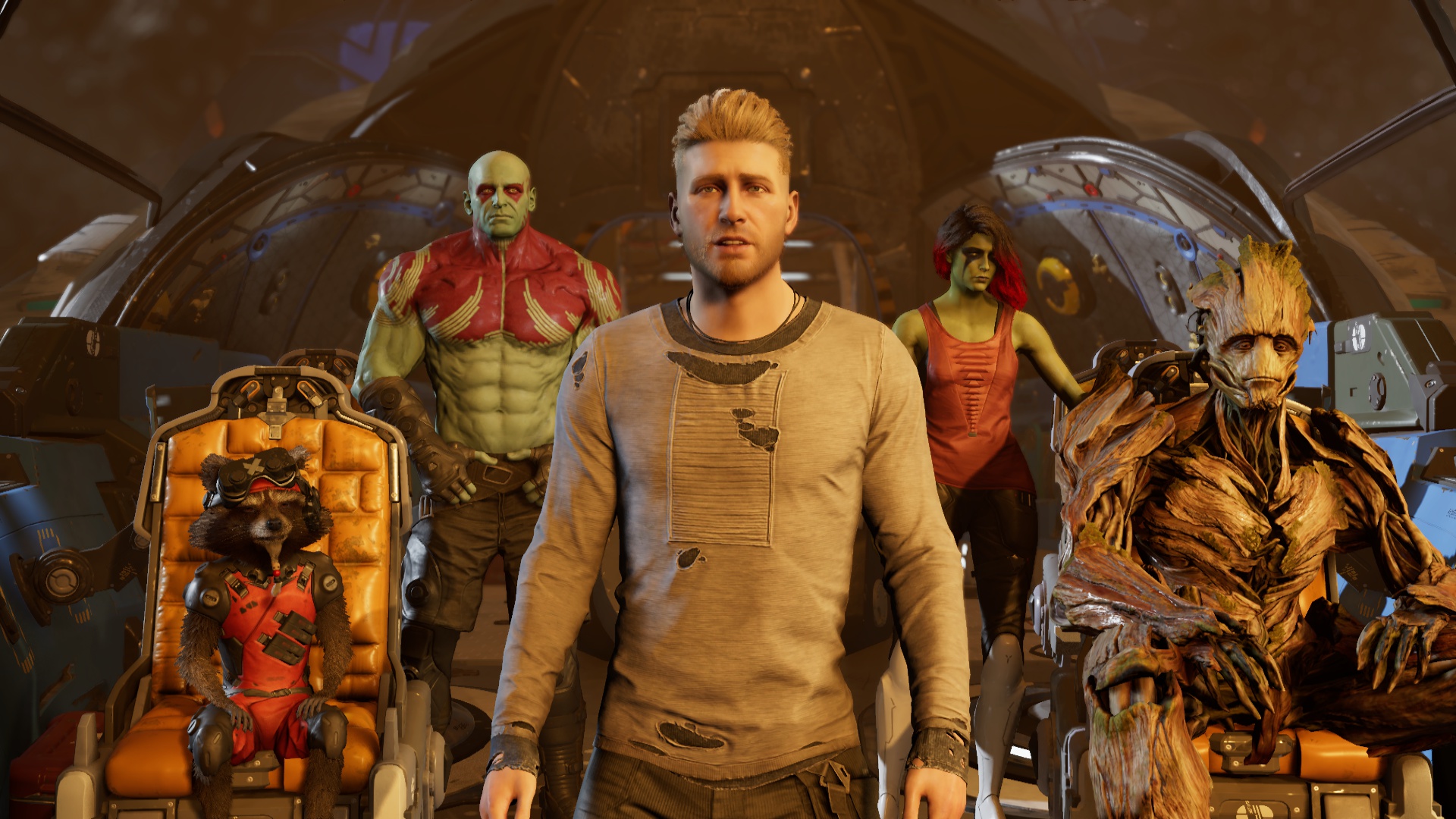Our Verdict
A surprisingly good time when you're not forced to reload your checkpoint after a game-breaking bug.
PC Gamer's got your back
What is it? A single-player space adventure full of moral choices.
Expect to pay: $60/£50
Developer: Eidos Montreal
Publisher: Square Enix
Reviewed on: Windows 10, GeForce GTX 1070, Intel Core i7-9700 CPU, 16GB RAM
Multiplayer? No
Release date: October 26
Link: Official site
I did not expect to root for Guardians of the Galaxy this much. It was weighed down by so many stagnant vibes during its pre-release cycle. The shadow of Marvel's Avengers, Square Enix's 2020 attempt to transmute the total media superiority of the Marvel Cinematic Universe into a living co-op videogame, loomed particularly large. That game's cast of Hollywood facsimiles—all of these fake Chris Hemsworths—left customers ice cold, and while the core narrative was decent, nobody enjoyed the meaningless currency grind.
Guardians comes from the same publisher and appears to be made of the same stock, except that this time, it's a singleplayer-only campaign and the player is restricted to the least interesting member of the troupe, Star-Lord. There is a pervasive focus-tested coldness that corrodes so many products that bear the Marvel name in 2021, and I wasn't optimistic that Eidos Montreal would be capable of overcoming the taint.
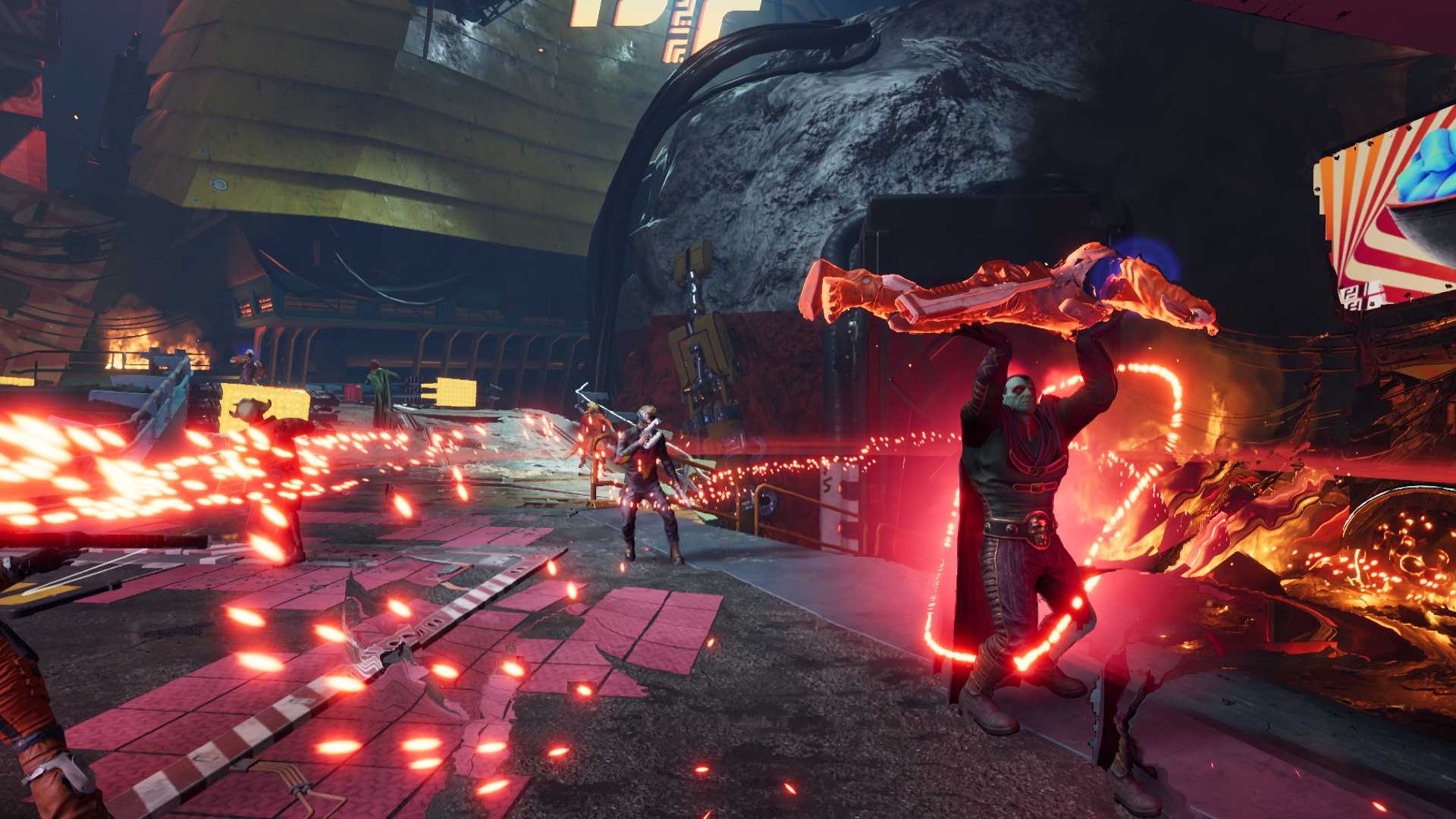
That is until I solved a puzzle involving a psychedelic space llama who I needed to coax into chewing up some wires on the ship. The beast was either enchanted or repelled by each crewmember's singing voice—he'd come closer to Star-Lord's melody, run away from Rocket Raccoon's, and so on—so we all took turns belting out Bobby McFerrin's "Don't Worry Be Happy" until our mercurial llama was finally in place. Guardians is full of sequences that capture the odder, funnier, lighter side of Marvel's cosmic expanse. I ran into a Soviet test-flight golden retriever blessed with celestial hyper-intelligence, and in a moment of weakness, he admitted to me how much he missed his former puny dog-intellect, those endless afternoons chasing tennis balls in the front lawn. There's a fourth-wall-breaking left-hook, taken right out of the Arkham playbook, tying to an amazing twist that caught me hilariously off-guard. Hell, deep into the game's final acts, I watched as the permanently chaffed Rocket Raccoon faced his one lingering trauma thanks to the encouragement and support of his teammates. The scene worked as a better emotional payoff than anything I've seen the character do on film. Guardians of the Galaxy has its heart in the right place… if only the game itself weren't constantly sabotaging those efforts with exhausting technical jank.
Like Avengers before it, Guardians of the Galaxy is steeped deep in the character-action tradition. You take control of Star-Lord, as I mentioned earlier, and unload an endless stream of photon beams at all the toothy beasties, corrupt interplanetary cops, and deranged cult leaders that stand in your way. A bar on the left side of the screen fills up as the player deals damage, punctuated with Marvel-fied versions of those vintage Devil May Cry descriptors—"Marvelous!" "Uncanny!" The remaining Guardians come into play with your unlockable special power rolodex. I could ask Groot to bind my enemies to the floor with his roots, or summon up Drax for an earth-shattering ground pound. But outside of those instances, your fellow superheroes are relegated to the nameless faces that tend to populate Call of Duty levels, offering the faint image of warfighting solidarity, without actually doing anything all that productive.
It gets the job done. The combat isn't where Guardians of the Galaxy shines, but it is both flashy enough and simple enough to sustain some of the more active portions of the plot. I found that the villain-fighting got more engaging the closer I came to the game's conclusion. In the beginning, armed with only a pair of pea-shooters and a handful of basic attacks, Guardians is a shooting gallery with no pulse. But when you're popping off multiple cooldowns at once and enjoying a fully optimized arsenal, the design gets close to that overwhelming, splash-panel, polychromatic eye candy that is so often prioritized in the films. Lasers, bombs, swords, and Drax flying in off the top rope like a punishing Marvel vs Capcom assist. One of the best features in Guardians of the Galaxy is its "Huddle Up" function. Every once in a while you can call the team together, offer some words of encouragement, and re-enter the fray with a damage buff cued to a pulpy '80s classic pulled from the game's trove of licensed material. (I heard Gary Numan's "Cars," Wham's "Wake Me Up Before You Go-Go," Soft Cell's "Tainted Love.") It is genuinely incandescent.
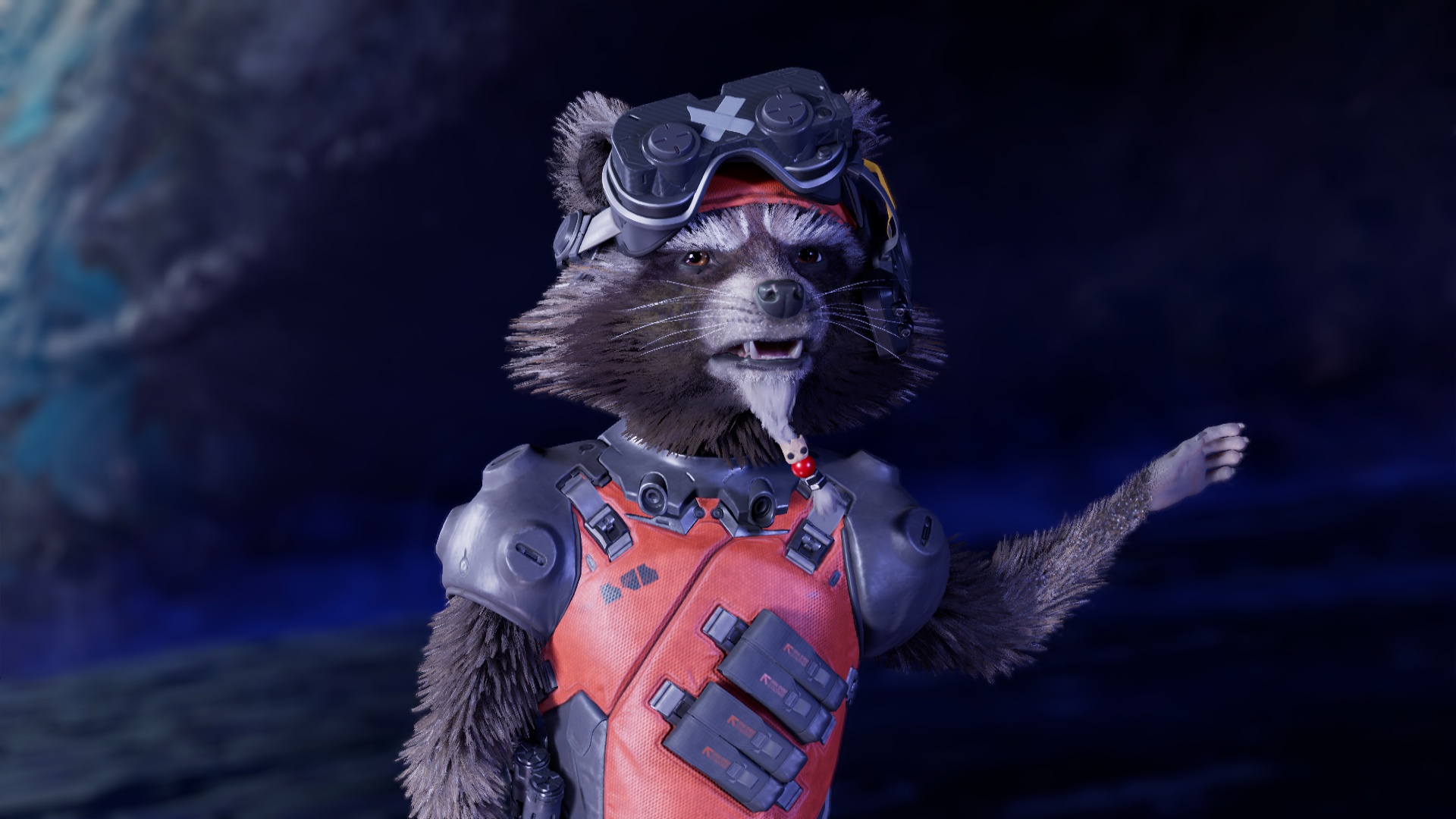
The story here is centered around the usual universe-threatening Marvel disaster. There's some sort of hyper-religious stellar church corrupting the minds of the Andromeda Galaxy. Our motley crew is here to stop it, even as the odds continue to pile up against us. The Guardians might be a roving batch of greedy malcontents, but at least they've got a heart of gold.
The broad-strokes didn't interest me much, but Guardians does a good job integrating the uber-high stakes into the cloistered anxieties of the heroes themselves. One of the cult's first victims? A girl who may or may not be Star-Lord's illegitimate child. How could a bunch of daffy venerated nerds ever seduce a chiseled meathead like Drax? Maybe by introducing the memories of his dead wife and daughter.
All of this is buttressed by Guardians' moral choice infrastructure, which is clearly ripped directly from the Telltale convention. Along the way, Star-Lord has a hand in shaping the team's plans and posture, which have a light impact on the narrative. In the interstitial periods between missions, you can chop it up with the team on the ship, akin to those elliptical therapy sessions hosted by Commander Shepard on the Normandy. The writers here are clearly bound by Marvel orthodoxy, but it was still cool to see some of their own flourishes. (Gamora, for instance, is a huge action figure collector in this timeline.)
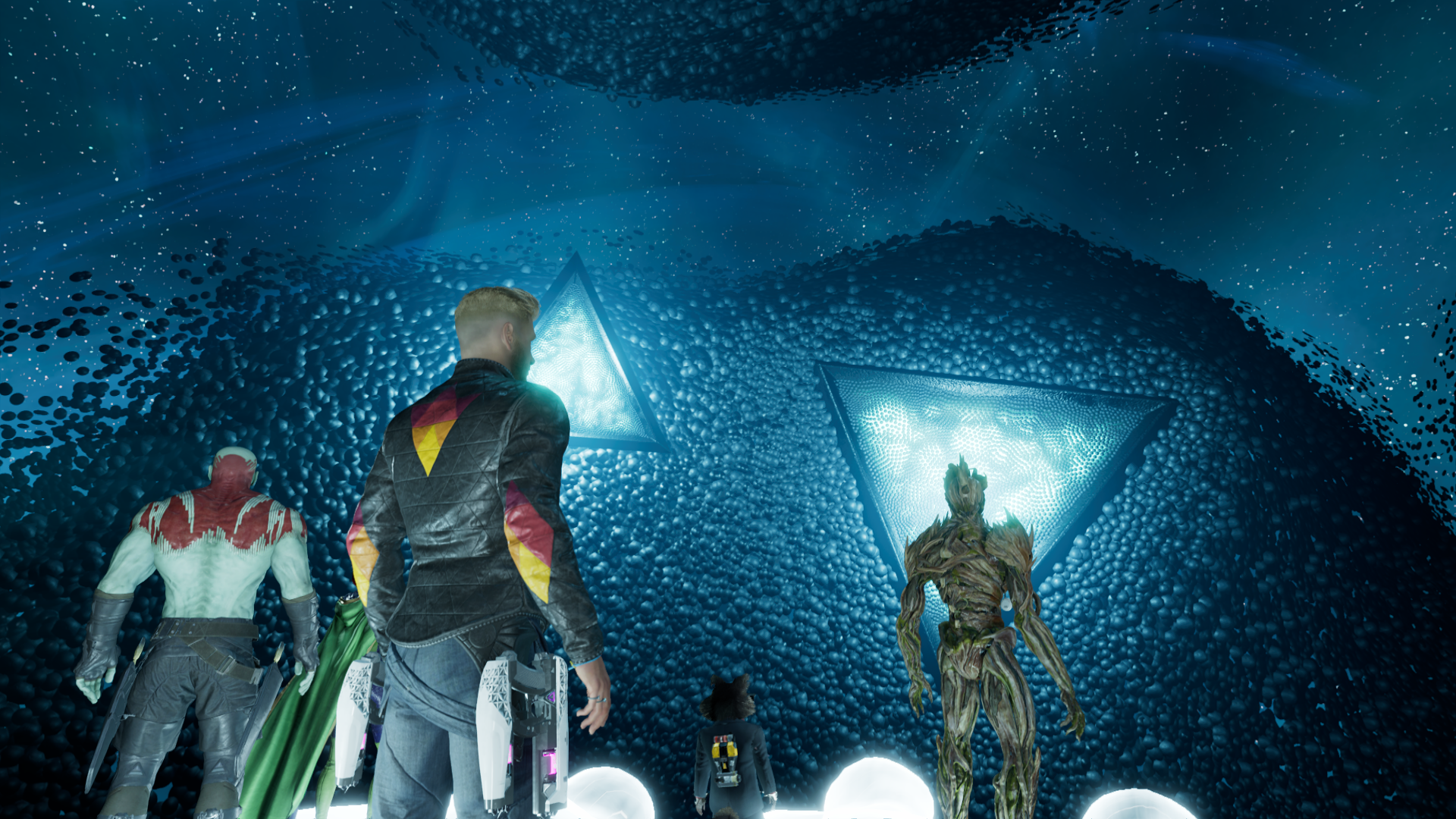
I should reiterate again that Guardians of the Galaxy is very much singleplayer and plot-focused. You move from chapter to chapter, disembarking on all sorts of famous Marvel locales, fighting through beautiful corridors that are occasionally broken up by some heavy-duty cutscenes. That makes the game a bit of a dinosaur, in a good way. A number of the attack unlocks are tied to certain wrinkles in the dramatic arc rather than meeting a certain threshold of resources. You will spend precisely zero minutes staring at talent trees or defensive integers. When I saw that the characters all had their own suite of greyed-out costumes, I thought for sure they were going to be cinched by some sort of depressing meta-grind and an in-game real money store. Nope, you just find those stashed away in the remote corners of the geography as a reward for taking the time to explore. It brings to mind the storytelling conventions of the Uncharted and God of War series. Eidos doesn't punch at quite that weight, but it does enough here to be mentioned alongside those influences.
This level of jank is expected in the high-entropy continent of Tamriel, not in a series of combat arenas and connective tissue.
That brings me to the core, debilitating issue with Guardians. This game is frequently, flagrantly broken. At one point I ran into three different crashes within a single hour of play. One was a bizarre soft-lock, the other two were straight-up hardcore freezes that required an alt-F4 to escape. The first boss I fought stopped moving a few times; it was stuck in stasis as I blasted away at its tentacles, scoring oodles of cheap damage. The game routinely believed Star-Lord had fallen down a phantom pit, and it dutifully teleported me back to some sort of crucible of danger completely haphazardly. I needed to reload checkpoints in order to get certain progression choke-points to trigger.
It's bad, and Square Enix knows it. When I first downloaded my review code for Guardians, it came in at a ridiculous 150GB size. A few days later, the company issued a new version that reduced the file size and promised greater stability. The crashes I described earlier all occurred after that big patch, though. Another patch came after and more will come, but the odds that every physics anomaly and crash will be swept up within days of launch are slim—the post-launch bug fixing phase can go for months and months with big games.
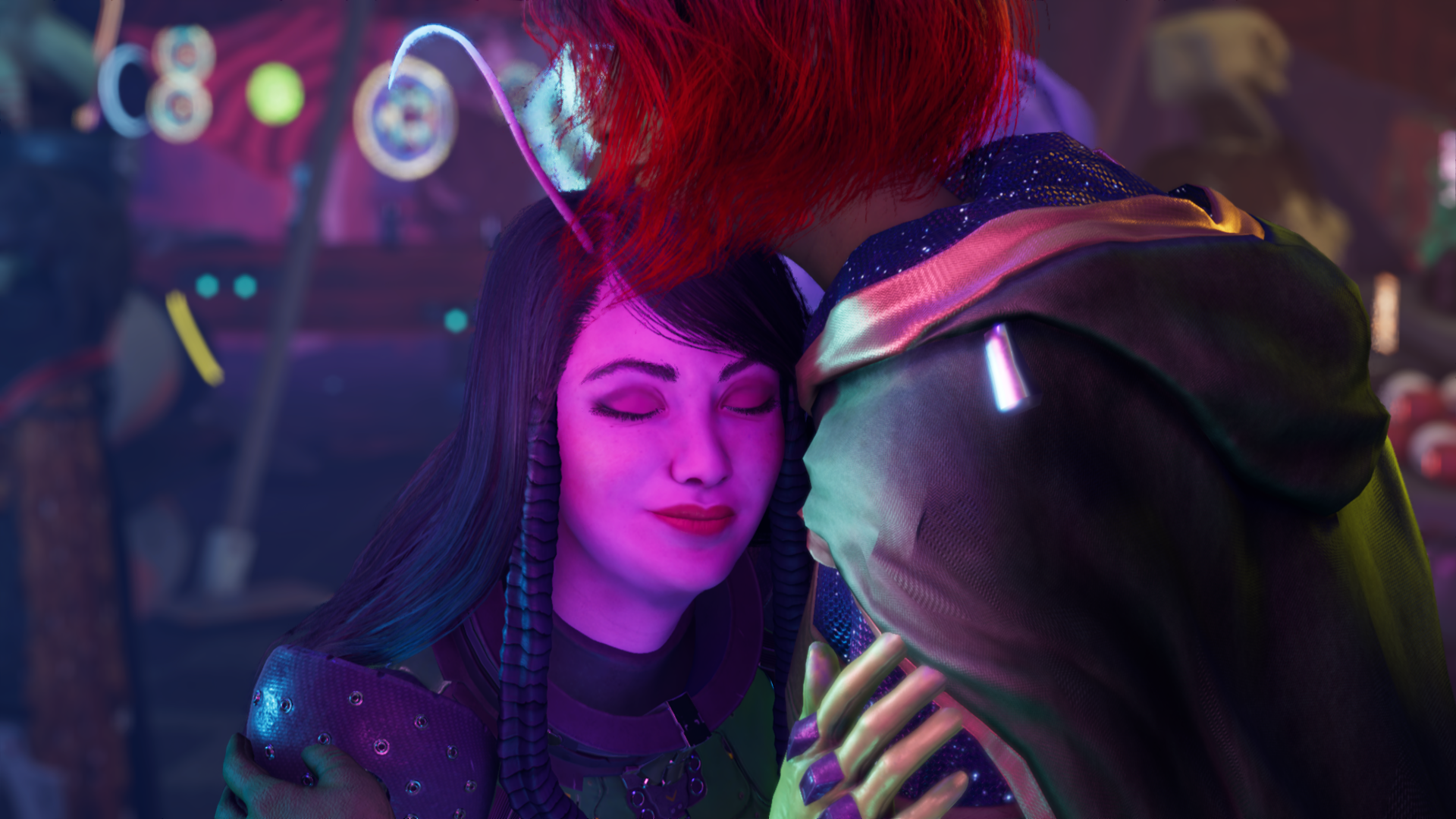
This makes Guardians of the Galaxy a difficult game to recommend right now. Something clearly went awry during development, because it's weird for a singleplayer, linear game to have so many bizarre performance issues. This level of jank is expected in the high-entropy continent of Tamriel, not in a series of combat arenas and connective tissue. The closest analogue I can think of is Jedi Fallen Order; another Disney property that shipped with a well-hewn narrative, some neat combat tricks, and a boatload of sundering technical hangups. Unfortunately, I don't think Guardians is quite good enough to offset those problems the way Respawn did.
But then I think back to a sequence early on, where Star-Lord runs into an old drinking buddy named Lipless at a slimy dive bar in Knowhere. The two of you fumble through a turgid hair-metal anthem that, apparently, the hero was too blacked-out to remember writing. The player chooses each line in the song, and Star-Lord does his best to half-mumble the lyrics to stay on Lipless' good side. Guardians of the Galaxy desperately wants to be a technicolor, starfaring adventure worthy of the multimedia powerhouse that shares its namesake. It accomplishes that with its story, its voice cast, and its wonderfully cheeky '80s pastiche. If only the technical side could better keep up with those ambitions.
A surprisingly good time when you're not forced to reload your checkpoint after a game-breaking bug.

Luke Winkie is a freelance journalist and contributor to many publications, including PC Gamer, The New York Times, Gawker, Slate, and Mel Magazine. In between bouts of writing about Hearthstone, World of Warcraft and Twitch culture here on PC Gamer, Luke also publishes the newsletter On Posting. As a self-described "chronic poster," Luke has "spent hours deep-scrolling through surreptitious Likes tabs to uncover the root of intra-publication beef and broken down quote-tweet animosity like it’s Super Bowl tape." When he graduated from journalism school, he had no idea how bad it was going to get.
